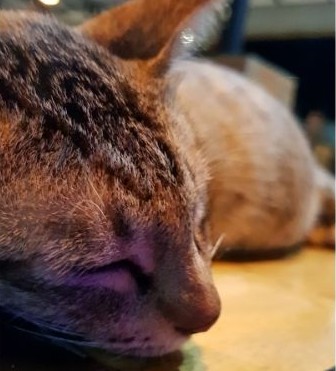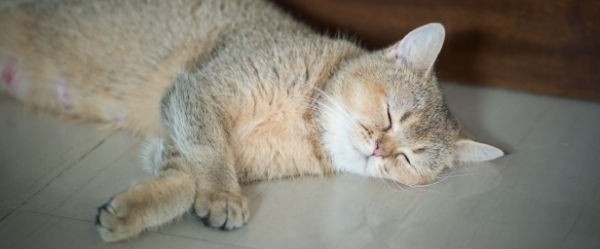“Do cats sleep more as they get older?” is a common question. Many cat owners are curious whether it is common for their older cats to sleep more. In this article, we will discuss this subject , and you will learn how much senior cats sleep, so that you can pay close attention to your cat’s health and make sure he is living the best life.
If your cat is elderly and sleeps in the litter box, it is probably because she has difficulty moving or passing waste. We recommend you check out the KittyGoHere Senior Cat Litter Box. You might also want to get the highly rated NuCat MultiVitamin for Cats.
Do Older Cats Sleep More
As cats get older, they need more time to rest. That happens to them just as it happens to us. Our daily tasks get more tiresome, and we feel less energy. Cats feel the same, and their bodies feel more tired from simple tasks.
If you notice your cat is sleeping through a huge part of the day, that might be just because he or she is an old cat that needs this extra time to restore energy.
How Much Do Senior Cats Sleep
It takes a lot to hunt, jump, and chase all your life. Sleep allows a senior cat’s bones, joints, and muscles to recuperate. Rest is important for arthritic cats since movement is uncomfortable.
A senior cat’s body doesn’t recuperate as quickly as it used to. So if your cat is healthy and typical, make his bed comfy and accessible.
Why Do Older Cats Sleep So Much
A career of hunting, leaping, and chasing is quite taxing on the body of a cat. Sleep allows an elderly cat’s ailing bones, joints, and muscles to recuperate. Rest is critical for an older cat who is arthritic, as movement will be more painful.
Feline mobility needs the coordination of several muscles, and an older cat’s body may not heal as quickly as it previously did. If your cat is healthy and behaves normally, concentrate on making his or her bed comfortable and accessible.
Once a cat attains senior status, it will spend a greater portion of its ordinary life sleeping. For example, a cat that is 11 years old or older may sleep up to 20 hours every day. This is a very natural method of recovery for senior cats.
Old Cat Sleeps All Day: Should You Worry?
Senior cats are often less active and lively, sleep more, gain or lose weight, and have difficulty accessing their favorite locations. However, do not attribute health or behavioral changes – which are often gradual – to old age.
Even though it is genuinely common for older cats to sleep more, some alterations may be indicative of common illnesses or dental concerns that your veterinarian should treat. In any case, you should always keep an eye out and take your cat to a vet regularly.
If your old cat does not regularly sleep a lot but suddenly has started to sleep too much, then you might need to worry.
Elderly Cat Snoring: Is It Normal?
Snoring is a sound produced during sleep as a result of the vibration of loose tissue in the upper airway. Snoring occurs when the channels in the upper airways vibrate noticeably when breathing. These passages include the nose, back of the mouth, and throat. Vibrations and snoring are more likely to occur during sleep when the tissues of the upper airways are relaxed.
Brachycephalic breeds like Persians, Burmese, and Himalayas are prone to snoring. Brachycephalic originates from two words: shortened and head. So brachycephalic cats have shorter skull bones, giving them a pushed-in face and nose. As a result, these cats’ nasal passageways are shortened, causing breathing issues, including snoring.
Overweight cats snore more owing to extra fat accumulation around the upper airways—one of the numerous reasons to keep your cat lean.
Due to their flexibility, cats may sleep in the most bizarre configurations, which can induce snoring. If so, the sound should be short and cease when your cat moves.
Respiratory issues such as a bacterial or fungal infection or asthma may induce snoring. A respiratory infection causes eye and nasal discharge, sneezing, coughing, and reduced activity and appetite.
Grass blades at the back of the mouth or nose may cause snoring, coughing, and anxiety.
If your cat begins snoring abruptly, or if the snoring grows louder, or if your cat exhibits other symptoms such as sneezing, coughing, or changes in appetite or behavior, you should call your veterinarian. Contact your veterinarian immediately if you observe your cat panting, wheezing, or having trouble breathing.
Elderly Cat Sleeping In Litter Box: Is It Ok?
Due to movement limitations, senior cats may sleep in their litter box. The most frequent cause of this is arthritis, which is more prevalent in older cats.
If your cat faces hardship to get out of the box, you might consider getting a litter box designed for senior cats that should address arthritis and any other difficulty precisely.
Perhaps your senior cat prefers to sit in the box rather than sleep in it. In reality, this might indicate that your cat is having difficulty passing waste.
This is particularly prevalent in senior cats that develop digestive problems. It might be because the cat is taking longer to do its business, or it could be in discomfort and unable to move.
Additionally, your cat may be sitting in its litter box to attract your attention. It is attempting to alert you to the fact that something is wrong.
Litter boxes are a haven for disease. Therefore, cat that sleeps in its litter box is more susceptible to bacterial and viral illnesses. Additionally, it may transfer infections around the home and onto you.

Old Cat Sleeping A Lot FAQ
Do Cats Get Sleepier As They Age?
Yes, cats definitely get sleepier as they age. Just like human beings, cats will become less active at their older ages. They will seek comfortable places to sleep for long hours, especially in the cold months.
What Is Considered Old Age For A Cat?
Cats were formerly considered seniors at the age of eight. Nowadays, veterinarians often see feline patients in their twenties.
Cats are now considered elderly around 12 to 14 years of age due to enhanced nutrition, indoor life, and advancements in veterinary health.
If your cat is already a senior, you might consider getting him or her food that is nutritious for their age and will help live longer, like the NuCat Senior Vitamin.
Do 10-Year-Old Cats Sleep A Lot?
The typical adult cat (which encompasses 10-year old ones) sleeps between 16 and 18 hours each day. A cat’s response to routine stimuli, such as the owner entering the room or cat food being prepared, should be immediate. If your cat is sleeping more than normal or is experiencing difficulty while lying down or getting up, this might be an indication of an underlying condition.
Final Words About Do Cats Sleep More As They Get Older
Having a pet always brings certain concerns regarding their eating and sleeping habits. If you have a cat friend at home and she is sleeping too much, this might just mean that she needs this extra rest.
If your elderly cat is sleeping in the litter box, it is probably because she has difficulty moving or passing waste. In that case, we recommend you check out the KittyGoHere Senior Cat Litter Box. You might also want to get the highly rated NuCat Senior MultiVitamin for Cats.
Finally, if you are worried, then be sure to check everything we described. Perhaps it is time to visit a vet.
Table of Contents



